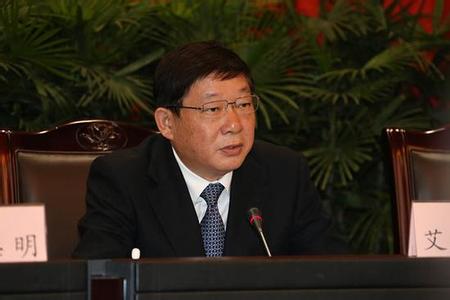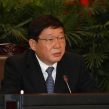
China’s Anti-Graft Campaign in Review
Publication: China Brief Volume: 15 Issue: 23
By:

China’s anti-graft campaign reached a milestone last month with the early November detention of Shanghai and Beijing Vice Mayors, Ai Baojun and Lu Xiwen, respectively, on corruption charges. At least one official with the rank of vice minister or above from each of China’s 31 provinces and directly administered cities has been arrested (Xinhua, November 16; People’s Daily, November 11). Over the course of three years, China has seen perhaps the most thorough clean-government exercise since the end of the Cultural Revolution (1966–76). Since the beginning of 2015, the focus of the Chinese Communist Party’s (CCP) Central Commission for Disciplinary Inspection (CCDI)—China’s highest-level graft-buster—seems to have moved to the corporate world. So far, senior managers from giant state-owned enterprise conglomerates, including CNPC, Sinopec, Chinalco, China FAW Group, Dongfeng Moters, Wuhan Steel, China Southern Airlines and China Resources, have been hauled in for investigations (People’s Daily, July 7; CEweekly.cn, June 1). While investigations of economic criminals in both state-controlled and private firms is expected to continue unabated, this is a good juncture to take stock of President Xi Jinping’s crusade to promote probity in the party-state apparatus since he took power in late 2012.
Firstly, has a moratorium been declared on hunting “big tigers,” top-level cadres with the rank of Politburo member or “state leaders”? Since Xi started anti-graft operations one month after he took over at the 18th Party Congress in November 2012, five big tigers have been incriminated. They are former Politburo Standing Committee (PBSC) member in charge of security, Zhou Yongkang; former Politburo members and vice chairmen of the Central Military Commission, Generals Xu Caihou and Guo Boxiong; and vice chairmen of the Chinese People’s Political Consultative Conference (CPPCC) Su Rong and Ling Jihua. Ling, a former director of the CCP General Office and head of the United Front Department, was detained in July (Wuhan Evening Post, October 30; China.cn, July 21). There are signs that enthusiasm for the campaign is decreasing. The CCDI admitted in a mid-year commentary that the anti-graft campaign could hurt the morale and image of the party. “The consequences of punishing every cadre who violates discipline and law hurt the party far worse than the individuals,” it said (South China Morning Post, June 3). This is particularly suggestive in light of the fact that elaborate preparations for the 19th Party Congress, set for late 2017, will begin in early 2016. The focus for this delicate period seems to be fostering unity, instead of exacerbating contradictions within the leadership.
Among the “potential big tigers” who have so far eluded the dragnet is former PBSC member and state vice president Zeng Qinghong (曾庆红), who was also the right-hand-man of former President Jiang Zemin. Speculation that Zeng, 76, might be the next party titan to fall was fed by an article posted on the CCDI website last February entitled “The problematic style of Prince Qing of the Qing Dynasty” (CCDI website, February 25, 2015). This extraordinary piece explained how Prince Qing, one of the most powerful ministers in the last days of the Qing Dynasty (1644–1911), accumulated vast wealth through ways including building up a labyrinthine network of corruption (Southern Metropolitan News, March 8; Xinhua, February 28). The article was likely a reference to Zeng because the same character “qing” (庆) is part of Zeng’s given name.
Like Prince Qing, Zeng is famous for his wheeling and dealing. Previously, as a vice party secretary of Shanghai, he helped Jiang Zemin nurture the Shanghai Faction into one of the biggest cliques in CCP politics. Also notable is the fact that Zeng’s son, Zeng Wei, a millionaire businessman, is widely assumed to be under 24-hour surveillance by the police (South China Morning Post, February 28; VOA Chinese, November 22, 2014). Now that nine months have elapsed since the intriguing CCDI article, the chances of Zeng—or other former PBSC members deemed to be prime CCDI targets—being nabbed seem to have significantly decreased.
Equally intriguing is the question of whether, as in the case of similar campaigns initiated by former Presidents Jiang Zemin and Hu Jintao, Xi’s fight against corruption is inextricably linked to factional infighting. Hints of this can be seen in the geographical distribution of the 59 senior cadres who have been investigated over the past three years. At least one official minister or vice minister has been arrested in 16 provinces and directly administered cities, while two each have been apprehended in five administrative units (China Economics Weekly, November 17; People’s Daily, November 15). With seven senior officials having been jailed, Shanxi is often considered China’s most corrupt province. It seems no coincidence that the central province is the power base of Ling, who is a key member of the Communist Youth League Faction headed by ex-president Hu. The bulk of the corrupt cadres in Sichuan (three), Hebei (three) and Hainan (two) are affiliates of a rent-seeking syndicate allegedly led by former PBSC member Zhou. Both Zhou and Ling, as well as the factions with which they are affiliated, are deemed thorns in the side of the president. That Xi and the CCDI are targeting rival factions within the CCP is illustrated by the “Code on Disciplinary Punishments” published last October by the Commission. This series of harsh regulations warned cadres and party members against “assembling factions within the party and forming cliques… [so as] to bolster the influence of individuals.” (See China Brief, November 2).
So far, the only major party faction that has not been hit are China’s princelings (太子党), the offspring of party elders and Politburo-level leaders. Members of the so-called “red aristocracy” figure prominently among the CEOs of state-owned enterprise (SOE) conglomerates; they also control a good number of the nation’s largest and most wealthy private firms (Reuters, April 10, 2014; International Consortium of Investigative Journalists, January 24, 2014). That both President Xi and Wang Qishan, the PBSC member in charge of the CCDI, are senior princelings has given rise to criticism that cadres with “revolutionary bloodline” are spared the full rigors of the clean-governance crusade. However, one explanation credits revolutionary fervor for their high morals. According to Ye Xiangzhen, the daughter of Marshal Ye Jianying (1897–1986), founders of the party were “imbued with the serve-the-people creed.” “Offspring [of party elders] are less prone to the temptations of corruption because they have been influenced by their forebears,” Ye told Hong Kong reporters (VOA Chinese, September 10, 2014; Ming Pao [Hong Kong], September 6, 2014).
By not incriminating a single princeling, Xi and Wang have thus opened themselves to accusations of “selective anti-corruption,” meaning that they will not go after fellow princelings or their children. According to Beijing-based writer and blogger Murong Xuecun, Xi’s most trusted allies and supporters were members of the red aristocracy. “These people [princelings] enjoy the kind of power and resources that ordinary people cannot even imagine,” Murong wrote. “They also have a strong ability to snatch wealth. So far, almost noone among this elite group has been investigated [for graft]” (Ming Pao, November 12; New York Times Chinese Edition, January 19). The only well-known princeling to have her image tainted by innuendo about improper business practice is Li Xiaolin, the high-profile daughter of former premier Li Peng. Li, who used to chair the state-run electricity giant China Power Investment Group, was demoted in mid-2015 to the post of deputy general manager of the much smaller Datang Power Group. There were also reports that she was not allowed to leave the capital. It soon emerged, however, that Li, who was famous for her designer-label wardrobe, was not subject to any corruption-related investigations (Hong Kong Economic Journal, June 12; WantChinaTimes [Taipei], June 12).
Yet, the biggest problem of President Xi’s anti-graft crusade is that it is often not waged according to the rule of law. This is despite Xi’s repeated assertions that his administration would strictly abide by the Constitution and “rule by law” (People’s Daily, February 24; Xinhua, December 31, 2014). Moreover, the Party mouthpiece Global Times argued that the reason why ongoing anti-corruption operations were more successful than previous exercises was that it was anchored upon “the background of [the promotion of] legalization in society and modernization of governance” (Global Times, July 26). A key factor is that the battle against graft is mainly handled by the CCDI, which, as a Party, rather than state organ, is not subject to the scrutiny of the legislature and the law courts.
Much has been written about the fact that the CCDI, reports only to President Xi. Moreover, the CCDI’s chief, Wang Qishan, is a close ally of Xi. Often considered the second most powerful person in China, Wang vastly expanded the powers of the CCDI over the last three years. For example, an unprecedented number of CCDI cadres have been named to senior slots in central and regional departments. Foremost among them is CCDI Deputy Secretary Chen Wenqing, who was promoted last October to Party Secretary of the Ministry of State Security (MSS). Often dubbed China’s KGB, the MSS is in charge of domestic security as well as counter-espionage. At about the same time, veteran CCDI investigators Geng Wenqing and Ren Jianhua were appointed head of the internal party disciplinary units of, respectively, the Ministry of Human Resources and Social Security and the National Development and Reform Commission (Southern Metropolitan News, October 8; People’s Daily, September 1). Others have been dispatched to top positions in “corruption disaster zones,” such as Shaanxi Province. Late last year, two Standing Committee members of the CCDI, Fu Jianhua and Huang Xiaowei, were respectively named Shanxi’s vice governor and secretary of the Shanxi disciplinary inspection commission (People’s Daily, November 18, 2014; Ta Kung Pao [Hong Kong], October 10, 2014).
As Peking University law professor He Weifang pointed out, clean and effective governance can only be built on the basis of democratic institutions. “Beating up tigers is no substitute for reform of the political structure,” he wrote in his blog. “A newspaper that is not controlled by the party is more effective [in eradicating graft] than ten CCDIs.” The prominent public intellectual added that “the fundamental strategy against corruption is to promote freedom of the media, independence of the judiciary, supervision by systems of people’s representatives and declaration of wealth by officials” (He Weifang’s blog, July 25, 2014; He Weifang’s blog, February 17, 2014). Given President Xi’s well-known antipathy toward Western political norms and institutions, however, China’s anti-graft movement will likely remain constrained by Communist-party exigencies such as the dictates of the faction in power.
Dr. Willy Wo-Lap Lam is a Senior Fellow at The Jamestown Foundation. He is an Adjunct Professor at the Center for China Studies, the History Department and the Program of Master’s in Global Political Economy at the Chinese University of Hong Kong. He is the author of five books on China, including “Chinese Politics in the Xi Jinping Era: Renaissance, Reform, or Retrogression?”





